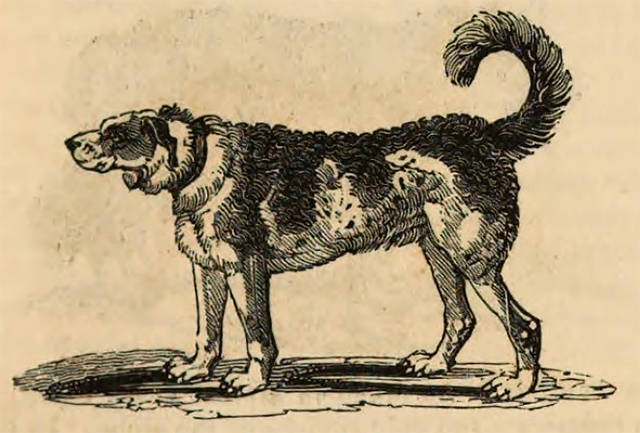[ Trimmer / A Natural History of the Most Remarkable Quadrupeds, Birds, Fishes, Serpents, Reptiles, and Insects ]
I have been able to find no information about Mary Trimmer. She is identified, on the title page of this work, as the author of A History of Man in a Savage and Civilized State.
Much of this work is adapted from earlier books of natural history, particularly from A General History of Quadrupeds by Thomas Bewick et al, which is clearly the principal source for the entry on Newfoundlands, though it seems to borrow also from the the anonymous A Complete Natural History (1813). The illustration of a Newf in this text bears a very strong resemblance to the Newf pictured in DeLaBere Pritchett Blaine's Canine Pathology (1817). The illustrations in this work are credited to "Mr. S. Williams."
This two-volume work of natural history for young readers was first published 1825 (Chiswick: C. and C. Whittingham); there were several subsequent editions. Text below is from the first edition, second volume.
The first mention of Newfoundlands occurs in the entry on the mastiff: "This species of dog is peculiar to our own country. It is nearly of the size of a Newfoundland dog. . . ." (35)

The entry on Newfoundlands reads as follows:
This animal, which came originally from the island whence it derives its name, has a remarkably pleasing countenance, is exceedingly docile, and of great size and sagacity. In their native country, they are extremely useful to the settlers on the coast, who employ them to bring wood from the interior. Three or four of them, yoked to a sledge, will draw three hundred weight of wood for several miles. In the performance of this task they are so expert as to need no driver. After having delivered their load, they will return to the woods with the empty sledge, and are then rewarded by being fed with dried fish. The feet of this dog are more palmated than usual; which structure enables it to swim very fast, to dive easily, and to bring up any thing from the bottom of the water. It is, indeed, almost as fond of the water as if it were an amphibious animal. So sagacious is it, and so prompt in lending assistance, that it has saved the lives of numberless persons, who were on the point of drowning; and this circumstance, together with its uniform good temper, has justly rendered it a universal favourite.
[
blank this frame ]
.a natural history of the most remarkable quadrupeds, birds, fishes, serpents, reptiles, and insects

